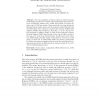Free Online Productivity Tools
i2Speak
i2Symbol
i2OCR
iTex2Img
iWeb2Print
iWeb2Shot
i2Type
iPdf2Split
iPdf2Merge
i2Bopomofo
i2Arabic
i2Style
i2Image
i2PDF
iLatex2Rtf
Sci2ools
126
click to vote
FSE
2006
Springer
2006
Springer
Reducing the Space Complexity of BDD-Based Attacks on Keystream Generators
The main application of stream ciphers is online-encryption of arbitrarily long data, for example when transmitting speech data between a Bluetooth headset and a mobile GSM phone or between the phone and a GSM base station. Many practically used and intensively discussed stream ciphers such as the E0 generator used in Bluetooth and the GSM cipher A5/1 consist of a small number of linear feedback shift registers (LFSRs) that transform a secret key x {0, 1}n into an output keystream of arbitrary length. In 2002, Krause proposed a Binary Decision Diagram (BDD) based attack on this type of ciphers, which in the case of E0 is the best short-keystream attack known so far. However, BDD-attacks generally require a large amount of memory. In this paper, we show how to substantially reduce the memory consumption by divide-and-conquer strategies and present the first comprehensive experimental results for the BDD-attack on reduced versions of E0, A5/1 and the self-shrinking generator.
Related Content
| Added | 22 Aug 2010 |
| Updated | 22 Aug 2010 |
| Type | Conference |
| Year | 2006 |
| Where | FSE |
| Authors | Matthias Krause, Dirk Stegemann |
Comments (0)

